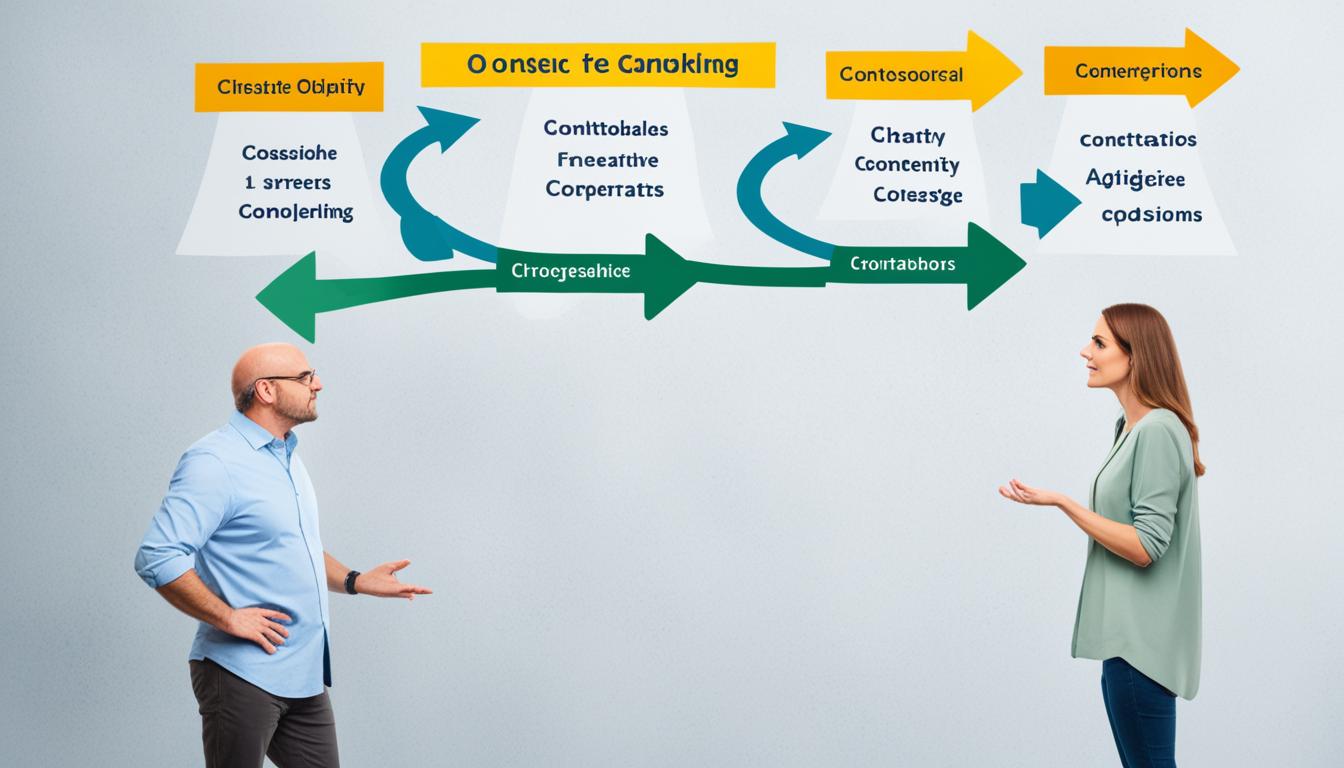“The secret of health for both mind and body is not to mourn for the past, nor to worry about the future, but to live the present moment wisely and earnestly.” – Buddha
Making difficult decisions can be overwhelming and stressful. Whether you’re facing a tough choice in your personal life or making a critical decision in your professional career, the decision-making process can often leave you feeling uncertain and indecisive. However, with the right tools and techniques, you can navigate through the complexity of decision-making and emerge with confidence and clarity.
In this article, we will explore various strategies and steps to help you overcome decision paralysis and make informed choices that align with your goals and values. From managing your emotions to utilizing reflective thinking, we will uncover the key elements that can empower you to conquer difficult decisions. So take a deep breath, trust in yourself, and let’s dive into the art of decision-making.
Key Takeaways:
- Understanding the factors that make decisions difficult is crucial for effective decision-making.
- Emotional intelligence plays a significant role in managing emotions during the decision-making process.
- Sleep and reflection can provide fresh perspectives and improve decision-making outcomes.
- Strategies such as limiting options, gathering information, and considering consequences can enhance decision-making.
- Developing intuition, trusting yourself, and applying critical thinking skills are valuable assets in decision-making.
Understanding the Complexity of Difficult Decisions
Difficult decisions are not solely about the options themselves, but rather how they are perceived by the decision maker. The stakes may be high, the options may be equally weighted in your mind, or the decision may trigger unhelpful memories or fears. It is important to recognize that decision-making is a complex process influenced by various psychological and emotional factors. By understanding these complexities, you can approach difficult decisions with greater clarity and self-awareness.
Factors that Make Decisions Difficult
- The high stakes involved can increase the complexity of a decision. When the outcomes have significant consequences, the pressure to make the right choice can be overwhelming.
- When facing a difficult decision, it is common to encounter options that seem equally appealing or undesirable. This can make it challenging to determine the best course of action.
- Personal biases and past experiences play a role in decision-making. Unhelpful memories or fears can cloud judgment and hinder the ability to make rational decisions.
Recognizing these factors and understanding the complexity of decision-making can help you navigate difficult choices more effectively. By gaining clarity on the influencing factors and being mindful of your own biases and emotions, you can make informed decisions that align with your goals and values.
Take a moment to reflect on a difficult decision you’ve faced in the past. Consider the factors that made it challenging and how your perception of the options influenced your choice. By analyzing your decision-making process, you can gain valuable insights into your own thought patterns and improve your ability to handle future difficult decisions.

Next, we will explore strategies for managing emotions in decision-making, helping you to maintain a clear and rational mindset when facing challenging choices.
Managing Emotions in Decision-Making
Emotions are an integral part of the decision-making process, and understanding how to manage them can greatly enhance your ability to make sound choices. When emotions are running high, they can cloud your judgment and lead to impulsive decision-making. However, by developing emotional intelligence and implementing effective strategies, you can gain control over your emotions and make decisions with a clear and rational mindset.
To manage your emotions effectively, it is essential to first recognize and acknowledge them. Take the time to identify the specific emotions you are experiencing, whether it’s fear, excitement, or anxiety. By labeling your emotions, you can gain a better understanding of their impact on your decision-making process.
Once you have identified your emotions, it’s important to regulate them. One technique that can help is to take a break. Stepping away from the decision-making process and engaging in a calming activity, such as taking a walk or practicing deep breathing, can help you regain control and clarity.
Another powerful strategy is to explore the underlying causes of your emotions. Dig deeper to understand why you are feeling a certain way about a particular decision. Is it based on past experiences, biases, or fears? By uncovering these underlying factors, you can gain insight into your emotions and make decisions based on rational thinking rather than emotional impulses.
Developing emotional intelligence, which involves understanding and managing your own emotions as well as empathizing with others, can also contribute to better decision-making. By cultivating self-awareness and empathy, you can navigate complex situations and interactions more effectively.
Benefits of Managing Emotions in Decision-Making
Effectively managing your emotions in the decision-making process offers several benefits. It allows you to approach choices with a clear and rational mindset, enabling you to evaluate options objectively and consider the long-term consequences. By regulating your emotions, you can avoid impulsive decisions that may be driven solely by fleeting emotional states.
Moreover, managing your emotions fosters better communication and collaboration with others involved in the decision-making process. Emotional intelligence helps you understand different perspectives and navigate conflicting opinions, leading to more informed and inclusive decisions.
Remember, emotions are an important aspect of being human, and it is natural to experience them in decision-making. The key is to develop the awareness and skills needed to manage and utilize emotions effectively. By doing so, you can make decisions that align with your goals and values, leading to greater satisfaction and success.

| Strategy | Description |
|---|---|
| 1. Recognize and acknowledge your emotions | Identify the specific emotions you are experiencing to gain a better understanding of their impact on decision-making. |
| 2. Regulate your emotions | Take a break, practice deep breathing, or engage in calming activities to regain control and clarity. |
| 3. Explore underlying causes | Dive deeper into the reasons behind your emotions to uncover biases, fears, or past experiences that may be influencing your decision-making. |
| 4. Develop emotional intelligence | Cultivate self-awareness and empathy to navigate complex situations and interactions more effectively. |
The Power of Sleep and Reflection in Decision-Making
When it comes to making important decisions, getting enough quality sleep is often overlooked but plays a pivotal role in the outcome. Research has shown that sleep has a direct impact on cognitive function, memory consolidation, and emotional regulation – all of which are essential for effective decision-making.
During sleep, your brain goes through a process of unconscious thought that helps remove biases and allows for clearer thinking. This process, known as consolidation, strengthens the connections between different pieces of information, enabling you to see patterns and make connections that might not have been obvious while you were awake. By giving yourself a chance to rest and recuperate, you create an optimal environment for your brain to consolidate information and make sense of complex problems.
When faced with a difficult decision, taking the time to sleep on it can provide you with a fresh perspective and enable you to approach the situation with renewed clarity. It’s like hitting the reset button on your mind, allowing you to step back and gain a clearer understanding of the options and their potential consequences. By allowing your subconscious mind to work on the problem while you sleep, you give yourself the opportunity to tap into the wisdom of your intuition and make a more informed choice.
Reflection is another powerful tool that can enhance your decision-making abilities. By taking the time to reflect on past decisions, you can gain valuable insights and learn from your experiences. Reflecting on what worked well and what didn’t can help you identify patterns and make adjustments for future decision-making. It allows you to build a repertoire of strategies and approaches that have proven successful in the past, increasing your chances of making sound decisions in the future.

The Benefits of Sleep in Decision-Making:
- Enhances cognitive function, memory, and emotional regulation
- Removes biases and allows for clearer thinking
- Facilitates pattern recognition and connections between information
- Provides a fresh perspective on difficult decisions
The Power of Reflection in Decision-Making:
- Offers valuable insights and learnings from past decisions
- Identifies patterns and makes adjustments for future decision-making
- Builds a repertoire of strategies and approaches for effective decision-making
By recognizing the importance of sleep and incorporating reflection into your decision-making process, you can optimize your ability to make informed and strategic choices. So, next time you’re faced with a difficult decision, give yourself the gift of sleep and allow your mind to reflect, empowering yourself to conquer tough choices with clarity and confidence.
Strategies for Making Difficult Decisions
When facing tough decisions, it’s essential to have effective strategies in place to guide your decision-making process. By employing these techniques, you can navigate the complexities and uncertainties that come with difficult choices. Here are several strategies that can help you make informed and confident decisions:
1. Reduce Options to Avoid Analysis Paralysis
Having too many options can overwhelm and paralyze your decision-making process. To prevent analysis paralysis, limit your options to a manageable number. Focus on those that align with your goals, values, and priorities. By reducing the number of choices, you can streamline your decision-making process and gain a clearer perspective.
2. Gather Relevant Information
To make well-informed decisions, it’s crucial to gather relevant information about each option. Research and explore different sources to gain a comprehensive understanding of the potential outcomes and implications. By gathering information, you can make decisions based on facts and insights rather than assumptions or guesswork.
3. Consider the Consequences
When making tough decisions, it’s essential to consider the potential consequences of each choice. Evaluate the short-term and long-term effects that may result from your decision. This analysis can help you weigh the pros and cons, identify potential risks, and make a choice that aligns with your desired outcomes.
4. Seek Advice from Trusted Advisors
Don’t be afraid to seek advice and guidance from trusted advisors who have expertise or experience in the relevant area. Discuss your options and concerns with them to gain different perspectives and insights. Their input can provide valuable information and help you make a more informed decision.
5. Align Decisions with Personal Values
When facing difficult decisions, it’s important to consider how each option aligns with your personal values and principles. Reflect on what matters most to you and how each choice resonates with your core beliefs. Making decisions that align with your values can give you a sense of purpose and confidence in your choice.

Incorporating these strategies into your decision-making process can help you approach difficult choices with clarity and confidence. Remember, making tough decisions is an opportunity for growth and learning. By employing these techniques, you can navigate the complexities of decision-making and make choices that align with your goals and values.
Developing Intuition and Trusting Yourself
When it comes to making difficult decisions, developing your intuition and trusting yourself can be the key to finding the right path. Your intuition is that inner voice, that gut feeling that guides you in a certain direction. By learning to listen to your inner voice and trusting your gut, you can tap into a wellspring of wisdom and make choices that align with your true desires and values.
However, it is essential to distinguish between intuition and fear or discomfort caused by stepping outside of your comfort zone. Intuition comes from a place of inner knowing and is often accompanied by a sense of calm and certainty. On the other hand, fear and discomfort can stem from self-doubt or the fear of the unknown. By learning to differentiate between these two, you can make decisions that are truly aligned with your intuition.
So how can you develop your intuition and learn to trust yourself more? One way is to practice mindfulness and self-reflection. Take the time to quiet your mind, tune in to your inner thoughts, and pay attention to any intuitive signals that arise. Journaling can be a helpful tool for capturing and exploring these insights.
Another way to enhance your intuition is by honing your self-awareness. Take note of how certain decisions feel in your body. Are there any physical sensations that arise when you think about a particular choice? Your body can often provide valuable clues about what your intuition is trying to tell you.
Lastly, don’t be afraid to experiment and take risks. Trusting your intuition often requires stepping into the unknown and embracing uncertainty. By taking small steps and gradually testing your intuition, you can build trust in your inner guidance and make decisions that lead to personal growth and fulfillment.
Developing Intuition Tips:
- Practice mindfulness and self-reflection.
- Listen to your body and pay attention to physical sensations.
- Keep a journal to capture and explore your intuitive insights.
- Take small steps and gradually test your intuition.
| Benefits of Developing Intuition | How to Develop Intuition |
|---|---|
| 1. Enhanced decision-making abilities | 1. Practice mindfulness and self-reflection |
| 2. Increased self-trust and confidence | 2. Listen to your body and pay attention to physical sensations |
| 3. Alignment with personal values and desires | 3. Keep a journal to capture and explore intuitive insights |
| 4. Greater sense of fulfillment and purpose | 4. Take small steps and gradually test your intuition |
Using Critical Thinking and Reflective Decision-Making
In the process of making difficult decisions, it is crucial to employ critical thinking and engage in reflective decision-making. This involves evaluating past choices and objectively assessing their effectiveness. By analyzing the outcomes of your previous decisions, you can gain valuable insights into what works and what doesn’t.
Critical thinking allows you to examine the reasoning behind your choices and consider alternative perspectives. It helps you identify any biases or assumptions that may have influenced your decisions in the past. By questioning your own thought process and analyzing the evidence and information available, you can make more informed choices.
Reflecting on your decision-making patterns is also essential. By taking the time to understand your own values, beliefs, and goals, you can align your actions with your personal principles. Reflective decision-making enables you to learn from your past mistakes and successes, guiding you towards more effective decision-making in the future.
Benefits of Critical Thinking and Reflective Decision-Making
When you apply critical thinking and engage in reflective decision-making, you can:
- Enhance your problem-solving skills by analyzing situations from different angles.
- Improve your judgement and decision-making abilities by considering various factors and perspectives.
- Learn from past decisions, identifying patterns and making adjustments for better outcomes.
- Minimize the impact of biases and emotions on your decision-making process.
- Develop a deeper understanding of your own values and beliefs, leading to more meaningful and purposeful choices.
To illustrate the importance of critical thinking and reflective decision-making, consider the following table:
This table showcases the outcomes of decisions made by individuals who engaged in reflective decision-making versus those who did not. Through careful analysis of their past choices and a commitment to continuous learning, individuals practicing reflective decision-making achieved significantly better results in terms of satisfaction, goal attainment, and overall success.
Conclusion
Summarizing the decision-making strategies discussed in this article, making difficult decisions is a complex process influenced by various factors. By understanding the complexities of decision-making and managing your emotions, you can overcome decision paralysis and gain clarity. Taking the time for reflection and utilizing effective strategies such as limiting options and gathering information can provide valuable insights. Trusting your intuition and aligning your decisions with your values can further enhance your decision-making abilities. Additionally, developing critical thinking skills and learning from past decisions can contribute to making more effective choices in the future.
Remember, each decision presents an opportunity for growth and learning. By embracing the decision-making process and practicing these strategies, you can become a skilled decision-maker. The key is to approach difficult decisions with confidence and trust in your ability to make informed choices that align with your goals and values. Keep in mind that decision-making is not always about finding the perfect solution, but rather making the best possible decision based on the available information. So, embrace the challenge, trust yourself, and let your decision-making skills guide you towards success.
In conclusion, making difficult decisions requires a combination of self-awareness, emotional intelligence, and strategic thinking. By incorporating the decision-making strategies discussed in this article, you can navigate tough choices with confidence and clarity. Remember, each decision is an opportunity to learn, grow, and become a more skilled decision-maker. So, embrace the process, trust yourself, and seize every decision as a chance to shape your future.
FAQ
How can I make a difficult decision?
Making difficult decisions requires a thoughtful approach. Start by understanding the factors that make the decision challenging and consider the potential consequences of each choice. Seek advice from a trusted advisor, align your decision with your personal values, and trust your intuition. Reflect on past decisions and develop critical thinking skills. With practice, you can navigate difficult decisions with confidence.
What factors contribute to the complexity of difficult decisions?
Difficult decisions are influenced by various psychological and emotional factors. The stakes may be high, options may seem equally weighted, or the decision may trigger unhelpful memories or fears. Recognizing and understanding these complexities can help you approach difficult decisions with greater clarity and self-awareness.
How can I manage my emotions in decision-making?
Managing your emotions is key to making effective decisions. Strong emotions can cloud judgment and lead to impulsive or irrational choices. Techniques such as taking a break, deep breathing, and understanding the underlying emotions can help you gain control and approach decisions with a clear and rational mindset.
What role does sleep and reflection play in decision-making?
Getting adequate sleep is essential for effective decision-making. During sleep, a process of unconscious thought assists in removing biases and allowing for clearer thinking. Taking time to sleep on a difficult decision can provide a fresh perspective. Additionally, reflecting on past decisions can help you learn from experience and improve your decision-making skills.
What strategies can help me make difficult decisions?
Several strategies can help you navigate difficult decisions. Start by limiting your options to a manageable number to prevent analysis paralysis. Gather relevant information and consider the potential consequences of each choice. Seeking advice from a trusted advisor and aligning your decisions with your personal values can also support you in making more confident and purposeful choices.
How can I develop intuition and trust my own judgement?
Developing intuition involves listening to your inner voice and trusting your gut feelings. It’s crucial to distinguish between intuition and fear or discomfort caused by leaving your comfort zone. By practicing and reflecting on past decisions, you can enhance your intuition and learn to trust yourself, ultimately improving your decision-making abilities.
How does critical thinking and reflective decision-making contribute to effective choices?
Critical thinking involves evaluating past decisions objectively, assessing their effectiveness, and learning from experience. By applying critical thinking skills to previous decisions, you can develop a better understanding of what works and what doesn’t. Reflecting on your decision-making patterns and aligning your actions with your values can contribute to making more effective choices in the future.
In summary, what are the key strategies for difficult decision-making?
In conclusion, to conquer difficult decisions, it is important to understand the complexities involved by considering the factors that make decisions challenging. Managing emotions, getting adequate sleep, and reflecting on past choices contribute to making more informed decisions. Strategies such as limiting options, gathering information, seeking advice, and aligning decisions with personal values can also enhance decision-making. Trusting your intuition, applying critical thinking skills, and learning from experience are essential for making confident and purposeful choices.

